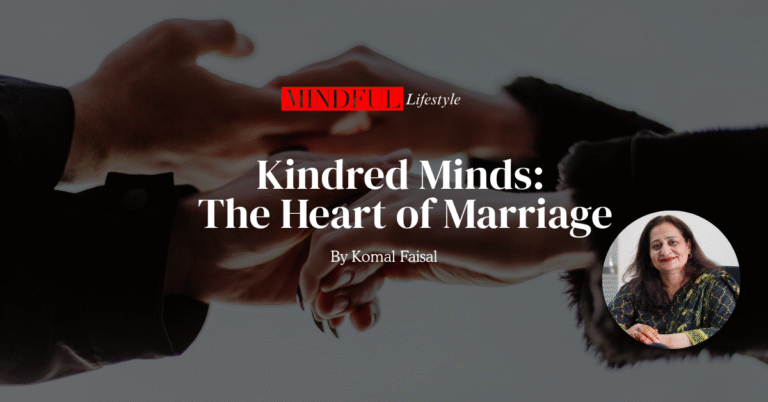By Komal Faisal
Relationships are like pathways that guide us towards more meaningful and productive lives. Their importance is recognised across both collectivistic and individualistic cultures, with marriage being one of the oldest institutions, socially and religiously sanctioned. We all need relationships to nurture our emotional and psychological needs, and it is essential to work on the ingredients that maintain their quality and foster growth.

However, it is equally important to understand that no relationship should require us to sacrifice our dreams or compromise our dignity. The genuineness of any relationship begins with having a healthy relationship with ourselves – something we often overlook as we rush blindly into relationships with others.
Marriage is often defined as a journey of love, care, and shared dreams. It is an institution with one of the longest histories in human society. Yet beneath the surface, it is also a partnership that requires constant understanding, particularly of each other’s mental and emotional states. Unlike many Western societies, we tend to underestimate the role of mental health as a root cause of relationship issues.
What many couples – and parents planning their children’s weddings – don’t realise is that mental health plays a crucial role in this journey. We often overlook red flags in our children’s behaviour, assuming that marriage will resolve their issues, when in reality, it may only amplify them.
In any marriage, the state of mind of both partners significantly influences the quality and longevity of the relationship. Understanding mental health and fostering awareness around it can be key to a happy and healthy marriage. While many focus on compatibility, wealth, or family backgrounds, one crucial yet often overlooked factor is mental wellbeing.
Mental health encompasses our emotional, psychological, and social wellbeing. It affects how we think, feel, and act. Stable mental health enables us to cope with life’s stresses, play multiple roles, build healthy connections, and navigate challenges with a positive mindset. Partners with good mental health are more likely to communicate openly, empathise with each other, and find joy in their relationship.
Every marriage has its challenges, but it should never damage the mental wellbeing of the partners. There will be times when you are in conflict with your partner and must make decisions that may not be in your favour; even then, it is possible to find outcomes that support mental health. Sadly, many of us remain unaware of how to balance a happy relationship or make efforts to maintain positive mental health within marriage.
In today’s materialistic world, couples often become so busy with their own pursuits that they fail to maintain the quality of their relationship, neglecting mental health issues until the damage is already done. Partners struggling with mental health challenges often face communication breakdown, lack of tolerance, anger issues, emotional withdrawal, escalating conflicts, lack of intimacy, anxiety, and depression. Over time, these issues can permanently damage the wellbeing of the entire family unit.
It is crucial to understand that marriage is not an end but a beginning. We need to be perceptive about red flags in our relationships, and if these persist, seeking professional help is necessary. According to Dr Emily Stone, “Good mental health allows partners to be present, to really listen to each other. When both partners are struggling mentally, it can feel like you are speaking different languages.”
Before working on the quality of a marriage, it is important to first be clear about whether you want to continue the relationship. This decision can be made with the help of a marriage counsellor or therapist. Living in an abusive marriage is never a sane choice, but if there are other issues, they can often be resolved by taking the necessary steps together – ideally under the guidance of a qualified therapist.
Relationships are important for everyone, and we all need to work on their quality. Perhaps the first step is to break the stigma around mental health. By normalising discussions about mental wellbeing within a marriage, couples can create a safe space for vulnerability. Seeking professional help is not a sin, and practising self-care is not selfish. We don’t need to live up to society’s typical label of being “strong,” because anxiety and depression can place an extra burden on a relationship, leading to further psychological challenges.
A progressive mindset requires supporting self-care and showing compassion, regardless of gender. If a woman can go through mental turmoil, so can a man. We must abandon the preconceived notion that men cannot experience mental breakdowns simply because they are expected to be strong in their stereotypical roles. Men carry their own emotional burdens, and it is essential to regularly check in on your spouse’s wellbeing and educate each other.
At the end of the day, it’s not about fixing or blaming each other – it’s about holding space for each other’s struggles and celebrating each other’s growth. A great marriage is not when a perfect couple comes together, but when an imperfect couple learns to enjoy their differences.
To maintain sanity in a relationship, it is important to nurture it continuously: explore common interests, build a spiritual connection, practise forgiveness, perform small acts of kindness, take mindful walks, avoid dwelling on negative thoughts, and set healthy boundaries to enhance mental wellness within the marriage.
By facing and overcoming challenges, we not only grow stronger but also wiser and more compassionate, making both our inner and outer worlds more beautiful – because life is meant for living, not for giving up.
The writer is a consultant psychologist, trainer, and educationist, and the founder of Mind Studio. She is dedicated to promoting mental wellbeing through counselling, training, and educational initiatives.



